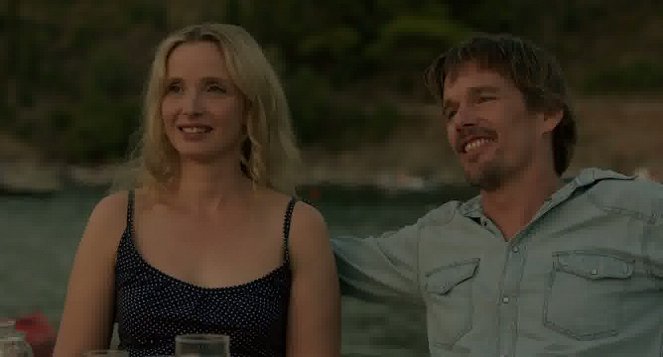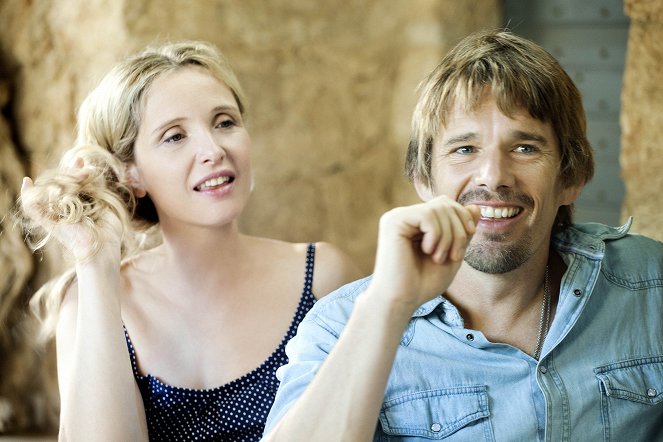Regie:
Richard LinklaterKamera:
Christos VoudourisMusik:
Graham ReynoldsBesetzung:
Julie Delpy, Ethan Hawke, Athina Rachel Tsangari, Panos Koronis, Ariane Labed, Walter Lassally, John Sloss, Seamus Davey-Fitzpatrick (mehr)Streaming (4)
Inhalte(1)
Neun Jahre sind vergangen, seit Jesse (Ethan Hawke) sein Flugzeug zurück in die Vereinigten Staaten verpasst hat, um stattdessen bei Celine (Julie Delpy) in Paris zu bleiben. Nun verbringen der amerikanische Schriftsteller und die impulsive Französin ihren Sommerurlaub bei Freunden in Griechenland. Doch der letzte gemeinsame Abend verläuft nicht wie erhofft und schließlich stehen beide vor der Frage, ob es für ihre Liebe überhaupt noch eine Zukunft gibt. (PROKINO)
(mehr)Videos (5)
Kritiken (10)
Anfangs werde ich mich darum bemühen, Unmögliches zu vollbringen und die einzelnen Teile voneinander zu trennen. Before Sunrise war eine wunderschöne naive romantische Komödie über zwei junge Menschen voller Ideale, die zufällig durch Liebe entflammen (verrückt spielen). Before Sunset eine Geschichte zweier reiferer Erwachsener, beginnen die irgendwohin zu schreiten, jedoch ihre Erinnerungen ziehen sie zu etwas, das sie vielleicht hätten tun sollen (es jedoch nicht getan haben). Before Midnight ist wiederum die Story zweier Menschen, die ihr Leben der Erinnerung wegen verändert und das getan haben, wobei sie sich am Anfang versprochen hatten, eben das nie zu tun. Infolgedessen ist der dritte Film gezwungenermaßen der offenste, intimste (es bleiben nur wenige offene Geheimnisse und Raum, vorzutäuschen, "Ich sei jemand anders"), der schmerzhafteste (es werden hier viele der Themen aufgegriffen, die bei früheren Gelegenheiten Gegenstand von Witzen waren, jedoch jetzt lacht es sich bedeutend schwerer darüber) und zeitgleich der am bedeutendsten sarkastische bis zynische. Es ist eine Konversationsanalyse des Alltags, welche ab und zu Überreste des "intellektuellen Sexappeals" enthüllt, den Jesse und Celine empfanden, aber vor allem ist es ein ziviler Tauchgang in Banalität, Müdigkeit und Angst, allein zu sein. Before Midnight sprudelt geradezu voller Ironie, sowohl intern als auch kontextuell (Besetzung der nonkonformistischen Beobachterin eines Zerfalls der traditionellen Familie durch Athina Rachel Tsangari als meckernde griechische Frau), es beinhaltet womöglich den besten Dialog der gesamten Trilogie (Szene in einem Auto), und entbehrt in großen Maße des Raschelns vom Vorgängerstreifen, der etwas mühsam "anknüpfte". Eine an Routine grenzende Glätte (jedoch die interessanteste), die kitschige Umgebung der griechischen Idylle, die andauernd durch kleinere Konflikte, Beängstigungen sowie den Verdacht und Vorahnungen verrissen wird, dass bei Before Midnight am Ende kein Platz mehr für einen Traum oder eine romantische Träumerei übrig bleiben wird. Dennoch wirkt die letzte Szene fragil und verspielt, voller Kontraste von Hoffnung, Resignation und Humor, was die Beziehung eines der bemerkenswertesten Filmduos poetisch und zugleich in unerbittlichem Maße nüchtern entfaltet. Linklaters minimalistische Regieführung triumphiert erneut hier und stützt sich auf die organisch dahinfließende Zeit, die manchmal durch Zäsuren von Traurigkeit/Verzauberung geteilt wird. Das Drehbuch ist noch weiter ausgefeilt, zugespitzter und voller scharfer Witze, obwohl man in einigen Szenen erneut zögert, ob die kleine Perle unten am Grunde des Gewässers den sprichwörtlichen Haufen großer Worte Wert ist. Ich möchte das ganze nicht aufteilen, aber wenn schon, dann wäre mir Midnight emotional und mental gesehen am nächsten. Also, Jesse und Celine, bis später ... wir sehen uns im nächsten Jahrzehnt.
()
In the final part of the trilogy, Linklater and I really clicked. His characters have finally grown up and, despite their flaws, they are now able to behave as mature parents and partners. It is no longer so self-centered because their children, acquaintances, and friends complement the married couple. In terms of age, worries, and emotions, I feel close to them and I understand their problems and behavior. I would say that Linklater has matured as a filmmaker during the long breaks between films. Overall impression: 80%.
()
Julie Delpy and Ethan Hawke’s romance hit my life out of the blue. I actually entered the story at a moment when they met for the second time, supposedly by coincidence and again in Paris. Yes, I didn’t have the honor of watching their first meeting after I saw this one. On the other hand, I believe that I got quite far when it comes to intimate discussions and I managed to catch a lot from the things that happen in the movie. Unfortunately, I simply can’t give it more than four stars. I think that maybe a woman would appreciate this part more than a man. Whatever is a victory for the lady in this movie is a challenge for the man. And I’m talking about relationships. And in this one, Julie does it several times. The opening part of the movie seems like pure bliss, especially that endless scene in the car. Then you get another great scene at the Greek lunch and in the end it’s all ruined by the night at the hotel. I don’t know why and I don’t want to be a male feminist, but it’s always the guy who’s at fault. Why is that? Anyways, Greece doesn’t get any sexier than it is in this movie. I’m really glad that even a couple of Americans, or rather the authors of this movie understood that Europe can be pretty amazing.
()
Anyone who has ever loved knows these fears. The fear of loneliness and at the same time fear of the weight of past decisions, of the power of chance and the relativity of time. Because romantic encounters are beautiful and spontaneous and magnificent, heart-rending reunions are unforgettable. But love years later is something that cannot be left to chance. Richard Linklater has resurfaced with a film that had countless opportunities to fail, to fail to live up to its predecessors, and to dilute the magic of what seemed definitive. And just like in Paris, I was blinded with tears by being able to pick up nine years later, in the same place. Some things in life may wither sooner or later and some things unfortunately intensify. And despite the fact that Before Midnight tears the heart in the most intimate and treacherous way, these two talkative travelers are once again at full strength. Their eighteen-year odyssey has no equal in the genre of romantic drama. And my sixth sense tells me that the year 2022 might bring us something good again.
()
Viaggio in Grecia. I got the same impression of superfluousness from The Godfather Part III, which at first glance was also made mainly for the purpose of reuniting old friends (real friends, not fictional). Everything essential was said before dusk and the rest belonged to reflections blurred by the spell of what was left unsaid. The third instalment abandons the concept of the previous two. The central couple is not under time pressure. They are not worried about the future, but they are haunted by the past to a greater extent than before. The dialogue is not between just the two of them, as other characters come into the picture, among whom all generations and at least three different worldviews are improbably represented. The attempt at a more complex definition of love in the 21st century (particularly the repeated allusions to modern communication technologies seem forced) disperses the attention that had previously been focused exclusively on the portrait of a single relationship over the course of time. The partners realise that the romantic situation (the hotel) was artificially created for them and they sarcastically comment on it, but they are still victims of film clichés (a previous partner is “destroyed” by alcoholism, the sexual act is interrupted by the ringing of a mobile telephone and if anyone is exposed not only in the figurative sense, it is only the woman). ___ Eric Rohmer had earlier fondly used dialogue as a crucial structural element, but he employed the mood of the surrounding environment to flesh out the characters. In Linklater’s previous two films, the space in which the dialogue took place could not be described as an extension of the characters’ inner world. Before Midnight offers a slight upgrade. It’s as if the summer-holiday mood of the chosen setting predetermined the less hurried tone of the film, and Greece, the land where tragedy was born – together with references to Medea and Rossellini’s Journey to Italy, culminating in the famous scene with the ancient statues – indicated a shift to more serious problems. Thanks to the partners’ sense of detachment and ability to engage in self-reflection, however, the film brings to mind the pleasant ease of previous encounters, despite the greater cynicism and cruelty in the emotional exposure, and the ancient tragedy fortunately does not happen (although fateful mistakes are made and the insurmountable differences between the genders bear some of its features). ___ It is apparent from the more bitter tone that both the director and the actors wanted to put the protagonists in a certain position and face them with certain problems that would push the tone of the “Before” sequence to the brink of total relationship de(con)struction along the lines of Who’s Afraid of Virginia Woolf? With respect to that, the element of chance that was a characteristic of the previous pair of films, which serious themes crept into quite casually, was weakened. The more ordinary framing detracted from the uniqueness of Celine and Jesse’s story. Though it’s true that the dialogue, again appropriately interspersed with meaningful silences, is still extraordinarily authentic and abounds with learned truths about life, the overall narrative structure is more carefully thought out and thus devoid of any hint of spontaneity. ___ Even though I didn’t find the film entirely believable, I would take the point of most of what it had to say. To hear the dialogue in an American film transition with such ease between comical, sentimental and cynical is a minor miracle (the naturalness of these “transitions” clearly shows that Delpy is a better actor than Hawke, who is more or less always thrown into the same casual position). Before Midnight is an invaluable treasure trove of useful advice for less experienced couples and bitter truths for those who have been around the relationship block before. As in the case of Before Sunrise and Before Sunset, anyone’s assessment of Before Midnight will be strongly influenced by their personal relationship experiences. I admit that if I give Before Midnight the lowest rating of all three films, that may be because I have not yet grown up enough to fully appreciate such a mature view of interpersonal relationships. Appendix: After some time had passed, I watched the film a second time and I have to admit that the “paradigm shift” from walking to walking away is radical enough to justify the slight change in style and the increase in the number of speaking characters. I particularly appreciate the naturalness with which we are prepared for the uncompromising solemnity at the end. It’s not merely the theme of conversations into which the fleetingness of time repeatedly creeps, but also, for example, the names of the characters (Ariadne, Achilles) referring to worlds that are ancient, vanished and yet still alive (not only in Greece). This dichotomy corresponds to the way Linklater and his two actors understand the coexistence of two beings. Despite their utterly sober view of relationship setbacks, with all their ephemerality, they do not completely renounce their romantic belief in eternal love. At least in this respect, Before Midnight is several decades ahead of most American romantic stories, which only falsely comfort us without a hint of scepticism. 80%
()
(weniger)
(mehr)



Werbung